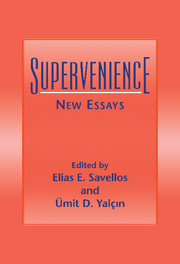Book contents
- Frontmatter
- Contents
- List of Contributors
- Introduction
- Varieties of Supervenience
- Supervenience: Model Theory of Metaphysics?
- “Global” Supervenient Determination: Too Permissive?
- Weak Supervenience Supervenes
- The Tweedledum and Tweedledee of Supervenience
- Reduction in the Mind of God
- Psychophysical Supervenience, Dependency, and Reduction
- Supervenience Redux
- Nonreducible Supervenient Causation
- Physicalism, Supervenience, and Dependence
- An Argument for Strong Supervenience
- Arguments for Supervenience and Physical Realization
- Supervenience and the Essences of Events
- How Does Ontology Supervene on What There Is?
- Supervenience and Intentionality
- Supervenience, Coherence, and Trustworthiness
- Does Truth Supervene on Evidence?
- Index
Arguments for Supervenience and Physical Realization
Published online by Cambridge University Press: 29 March 2010
- Frontmatter
- Contents
- List of Contributors
- Introduction
- Varieties of Supervenience
- Supervenience: Model Theory of Metaphysics?
- “Global” Supervenient Determination: Too Permissive?
- Weak Supervenience Supervenes
- The Tweedledum and Tweedledee of Supervenience
- Reduction in the Mind of God
- Psychophysical Supervenience, Dependency, and Reduction
- Supervenience Redux
- Nonreducible Supervenient Causation
- Physicalism, Supervenience, and Dependence
- An Argument for Strong Supervenience
- Arguments for Supervenience and Physical Realization
- Supervenience and the Essences of Events
- How Does Ontology Supervene on What There Is?
- Supervenience and Intentionality
- Supervenience, Coherence, and Trustworthiness
- Does Truth Supervene on Evidence?
- Index
Summary
Introduction
In this essay my primary focus will be on the why of supervenience, rather than the what. That is, I shall be more concerned with the arguments for supervenience, in particular for the supervenience of the mental on the physical, than with questions of precisely how to formulate the doctrine. Much has been written on the latter topic, but relatively little on the former. I think this is a pity, for it has encouraged the view that the supervenience of the mental on the physical depends on some kind of basic intuition and that those who find physicalism unappealing are therefore free to reject it. I will show that, on the contrary, the doctrine of supervenience is a simple consequence of some evident truths. (Of course, the “why” of supervenience is not entirely irrelevant to the “what”: once we understand the argument for the doctrine, we will be better able to see which versions of it are defensible.)
Once I have laid out the argument for supervenience, it will be helpful to compare it with a related argument for the thesis of physical realization (i.e., in the mind–brain case, the thesis that mental states are always realized by physical states). The relationship between the doctrine of supervenience and the doctrine of physical realization is not always well understood. Distinguishing the reasons for believing these two doctrines will help to clarify their relationship.
- Type
- Chapter
- Information
- SupervenienceNew Essays, pp. 226 - 243Publisher: Cambridge University PressPrint publication year: 1995
- 10
- Cited by



